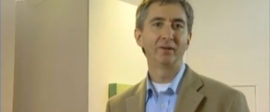The Sacred Commonplace
Blog / Produced by The High Calling
In George MacDonald’s 1876 novel, Thomas Wingfold, Curate, (now reedited and republished as The Curate's Awakening), a chapter entitled "The Common-Place," introduces Mr. Drew, a dealer in cloth who refers to his shop as "secular church."
One evening, just after closing, Reverend Wingfold, has dropped by Mr. Drew’s dry goods shop, and he listens as the merchant/layman describes the moment that he began to see his work and his workplace in new light:
“After the young men had put up the shutters and were gone," Drew said, “leaving me as usual to bolt the door, I fell a-thinking. There is something solemn in the quiet after business is over. Sometimes it's more so, sometimes less, but this time it came upon me that the shop felt like a chapel—had the very air of one somehow, and I fell a-thinking and forgot to close the door. A great awe came upon me.
"Could it be—might it not be that God was actually in my shop? I leaned over the counter, with my face in my hands, and went on half thinking, half praying. All at once the desire rose burning in my heart: Would to God my house of business were in truth a holy place, made sacred by his presence! 'And why not?' rejoined something within me—heart or brain or something deeper. 'Is it, or is it not, of God?'
"All of a sudden, I heard a step in the shop and lifting my head, I saw a poor woman with a child in her arms. Annoyed at being found in that posture, like one drunk or in despair; annoyed also with myself for not having shut the door, I had my usual harsh word trembling on my lips. Suddenly something made me look around in a kind of daze. A moment more and I understood: God was waiting to see what truth was in my words.
"Then I saw that the poor woman looked frightened—I suppose at my looks and gestures. I made haste and received her, and listened to her errand as if she had been a duchess—say rather an angel of God, for such I felt her in my heart to be. She wanted a bit of dark print with a particular kind of fleck in it, which she had seen in the shop some months before, but had not been able to buy. I turned over everything we had, and was almost ready to give up. At last, however, I found the very piece which had ever since kept haunting her fancy—just enough of it left for a dress! But all the time I sought it, I felt as if I were doing God service—or at least doing something he wanted me to do. It sounds almost ludicrous now, but . . . "
"God forbid!" said Wingfold.
"I'm glad you don't think so, sir. I was afraid you would."
"Had the thing been a trifle, I should still have said the same," returned the curate. "But who with any heart would call it a trifle to please the fancy of a poor woman, one who is probably far oftener vexed than pleased? She had been longing for this dress—you took trouble to content her with her desire. Who knows what it may do for the growth of the woman? I know what you've done for me by the story of it."
"She did walk out pleased-like," said the merchant,—"and left me more pleased than she—and so grateful to her for coming."
"I begin to suspect," said the curate, after a pause, "that the common transactions of life are the most sacred channels for the spread of the heavenly leaven. There was ten times more of the divine in selling her that dress material as you did, in the name of God, than in taking her into your pew and singing out of the same hymn-book with her."
"I should be glad to do that next though, if I had the chance," said Mr. Drew.*
___________________________
* George MacDonald, Thomas Wingfold, Curate, (London: Hurst and Blackett, 1876), Vol. II, 79–87, excerpted, edited, and repunctuated from the original by author. Text courtesy Harry Ransom Humanities Research Center, University of Texas, Austin. Currently available as The Curate's Awakening, Michael R. Phillips, Editor, (Minneapolis: Bethany, 1985).
—


.jpg)







